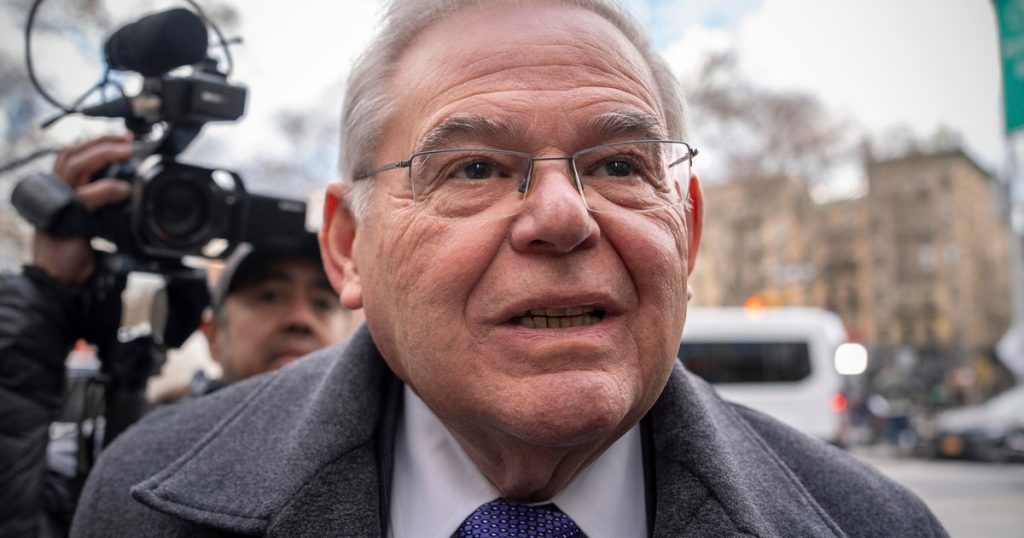Former Senator Bob Menendez is set to commence an 11-year prison sentence starting Tuesday, following his conviction on federal bribery charges. This ruling marks a significant point in a case that has garnered national attention due to the severe implications of corruption at high governmental levels. As details unfold surrounding his incarceration and the broader ramifications of his actions, the focus on the ethics of elected officials has intensified.
| Article Subheadings |
|---|
| 1) Overview of Conviction and Sentencing |
| 2) The Case Against Menendez |
| 3) Recent Developments and Legal Maneuvers |
| 4) Public Reaction and Implications |
| 5) Future Considerations for Former Officials |
Overview of Conviction and Sentencing
In federally charged cases, accountability is key. This was prominently illustrated when Bob Menendez was convicted of taking bribes in exchange for political favors. His sentencing, set to occur at a facility in Minersville, Pennsylvania, comes after a drawn-out legal battle that kept the public’s attention focused on the serious nature of corruption within the halls of power. Originally intended to report to prison in June, his request to attend a family wedding delayed his term. With Menendez opting for incarceration this week, questions arise about the implications of his actions on legislative ethics moving forward.
The Case Against Menendez
The conviction stems from allegations that Menendez accepted bribes to facilitate favorable treatment for business owners in New Jersey and even intervened to secure military aid for Egypt. The case, initiated by a comprehensive FBI investigation, revealed a substantial amount of cash ($480,000), alongside valuable assets like gold bars and a luxury vehicle found in his residence. The evidence presented highlighted not only the direct financial transactions but also the possible collusion with other convicted business individuals, further entrenching the idea of systemic corruption within public office. An examination not only of his actions but of the broader political environment was fundamental to understanding the gravity of these transgressions.
Recent Developments and Legal Maneuvers
Even with a conviction standing against him, Menendez has remained steadfast in his plea of innocence. His attempts to fight the sentencing and secure bail were recently turn away by a federal appeals court, solidifying his forthcoming imprisonment. During his sentencing, he expressed regret about the choices he made, admitting, “I am far from a perfect man.” Such declarations reflect a struggle to navigate the fallout from his criminal activities while attempting to elicit compassion.
In what appears to be a calculated shift, Menendez has also aligned himself with critiques of the judicial system espoused by former President Donald Trump. His statements hint at a desire for pardon, while simultaneously criticizing the political nature of his sentencing. This strategic positioning could suggest an effort to sway public opinion in his favor as he looks for potential avenues to reduce his sentence.
Public Reaction and Implications
The public’s reaction to the case has been predominantly one of dismay, especially considering Menendez‘s former standing as a prominent lawmaker. Public trust in elected officials frequently falters under the weight of scandal, negatively impacting the perception of legislative integrity. Observers from various political backgrounds have expressed concerns regarding widespread implications of corruption, urging for more stringent ethical guidelines aimed at elected officials.
This situation serves as a catalyst for discussion regarding the accountability of public servants. The ramifications extend beyond just one individual’s fate, seeping into the political landscape and how constituents view their representatives. National discourse surrounding ethical responsibilities and legislative accountability for politicians has bolstered calls for reform in governmental oversight as a reaction to such high-profile cases of misconduct.
Future Considerations for Former Officials
As Menendez prepares to enter his prison sentence, his predicament raises critical questions about the future of former politicians embroiled in legal troubles. The question of how accountability measures might change revolves around whether this case will set a new precedent. Observers speculate that as more public figures face scrutiny, a cultural shift might prompt adaptations in how corruption is perceived and dealt with legally.
Future legislative measures could emerge following this case, improving transparency and reinforcing ethical standards among lawmakers. The outcome of Menendez‘s appeal process will likely be closely watched and could influence similar cases, steering discussions on the integrity of public office into a more vigilant and aware direction.
| No. | Key Points |
|---|---|
| 1 | Former Senator Bob Menendez begins an 11-year prison sentence for bribery charges. |
| 2 | He was convicted of accepting bribes to protect businesses and facilitate U.S. military aid to Egypt. |
| 3 | Menendez’s attempts to overturn his conviction have been rejected by a federal appeals court. |
| 4 | The case has sparked public discussions on the ethics and accountability of elected officials. |
| 5 | Future implications may lead to new legislation on governmental ethics and transparency. |
Summary
The sentencing of former Senator Bob Menendez marks a pivotal moment for discussions surrounding political corruption and accountability in government. This case not only impacts Menendez’s life but also serves as a significant indicator of the integrity of elected officials, inspiring calls for enhanced ethical standards. As the public awaits further developments, the future of political oversight remains uncertain yet increasingly relevant.
Frequently Asked Questions
Question: What are the charges against Bob Menendez?
Bob Menendez was convicted of accepting bribes from business owners in exchange for political favors, including protecting them from criminal investigations.
Question: How long is Menendez’s prison sentence?
He has been sentenced to 11 years in prison, set to begin reporting to a facility in Pennsylvania.
Question: What are the implications of his case for other politicians?
Menendez’s case has sparked widespread discussion about ethical standards in government, potentially leading to reforms aimed at improving accountability among elected officials.
